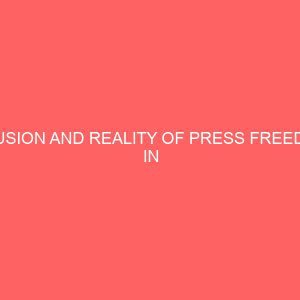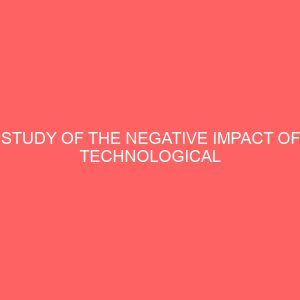Description
ANAMMCO NIGERIA PLC, ENUGU
UNILVER NIGERIA PLC ENUGU
NIGERIA BREWERIES ENUGU
To carry out the research, the researcher was able to discover the job prospects of secretaries.
i. Who is a secretary?
ii. Modern technology innovations and employment opportunities for secretaries
iii. Career and employment opportunities for secretaries.
iv. Job prospects of secretaries.
The relevant literature was reviewed and some reference was made to know the project of secretaries.
The researcher then used questionnaire, oral interview and direct observation in collecting the necessary data and information required. Sample size were determined and validity and reliability of instruments were known.
The researcher presented and analyzed the data gotten from the questionnaire.
Finally, the researcher after everything summarized the findings from the data gotten and resolved into making reasonable recommendations before concluding at last.
Approval Page
Acknowledgement
Dedication
Abstract
List Of Tables
Table Of ContentChapter One
1.0 Introduction
1.1 Background Of The Study
1.2 Statement Of The Problem
1.3 Significance Of The Study
1.4 Purpose Of The Study
1.5 Delimitations Of The Study
1.6 Research Questions
Chapter Two
2.0 Literature Review
2.1 Modern Technology Innovations And Employment Opportunities For Secretaries
2.2 Job Prospects Of Secretaries
2.3 Summary Of Literature Review
Chapter Three
3.0 Research Design
3.1 Areas Of Study
3.2 Population Of The Study
3.3 Sources Of Data
3.4 Questionnaire Design And Allocation
3.5 Method Of Data Collection
3.6 Data Analysis Procedure
Chapter Four
4.0 Data Presentation And Analysis
Chapter Five
5.0 Summary Of Findings
5.1 Conclusions
5.2 Further Research
5.3 Recommendations
5.4 Limitation Of The Study
Bibliography
Questionnaire
1.0 INTRODUCTION
1.1 BACKGROUND OF THE STUDY
In order to carry out a meaningful research into the job prospects of secretaries, it may be necessary to attempt a definition of a secretary and the functions he/she is expected to perform. A secretary is someone who assists a top executive in the office by performing his/her secretarial duties, skillfully and who possesses the ability to relieve the executive of certain administrative tasks.
Also, Marshal (1973:2) defined secretary as an Assistant to the executive secretary as an assistant to the executive possessing mastery of office skills and ability to assume responsibility without direct supervision who displays initiative, exercises judgment and makes decision within the scope of her authority.
In the business organization, the secretary is a great asset to her boss, she is his personal organizer. She uses different typewriters, computers which are her tools in the office. She takes shorthand dictations and transcribes them to produce mailable letters. The secretary is generally the life-wire of any organization.
The secretary also performs the duties of using different filing systems to file documents,, arrangement and preparation of Board/Management meetings and prepare notices and Agenda of meetings. She also takes speeches in shorthand at conference, seminars and low courts. She also books appointments for the boss and takes care of his itinerary. The duties of the secretary is so enormous and vast that listing them will be inexhaustible.
These are various categories of secretaries in Business organization before the civil service reform of 1988 namely:
1. Confidential Secretary IV
2. Confidential Secretary III
3. Confidential Secretary II
4. Confidential Secretary I
5. Personal Secretary
(Principal Secretary Assistant Grades)
6. Personal Secretary Grade
(Principal Secretary 2)
7. Senior Personal Secretary
(Principal Secretary Assistant I)
8. Principal Personal Secretary
(Chief Secretary)
9. Bilingual Secretary
10. Verbation/Official Reports
However, the guidelines on the civil service reform of 1988 changed the titles as follows:
Old Titles New Titles
1. Principal Personal Secretary Chief Secretarial Assistant
2. Senior Personal Secretary Principal Secretariat Assistant I
3. Personal Secretary I Principal Secretarial Assistant I
4. Personal Secretary II Principal Secretarial Assistant III
5. Confidential Secretary I Principal Secretarial Assistant IV
6. Confidential Secretary II Senior Secretarial Assistant
7. Confidential Secretary III Secretarial Assistant I
8. Confidential Secretary IV Secretarial Assistant II
Though secretaries job titles have been harmononized, they do not reach the same position in rank with their bosses because they are subordinates to their bosses.
STATEMENT OF PROBLEM:
The secretary is faced with numerous problems, one of which is uncertainty of advancement in her job in terms of promotion, job training and lack of welfarism.
Some business organizations exploit the secretaries by not making the jobs they schedule.
In addition, she is not given the necessary incentives thus frustrated in her job.
Moreover, secretaries in some business organizations are made to stagnate or “mark time” in a grade level due to lack of promotion given to them.
SIGNIFICANCE OF THE STUDY
This study is expected to bring out the job prospects of secretaries in area like job remuneration, promotion, welfare and more job training in today’s business organizations.
When these prospects are known they will motivate new entrants into the secretarial profession.
Recommendations will be made to business organizations on how to motivate secretaries. This will also make secretaries not to change their profession or be forced out of their jobs.
Moreover, this study can also serve as a future reference in the library. It can serve as future reference to both the student and the lecturer.
PURPOSE OF THE STUDY:
1. To identify employment opportunities available to secretaries in those selected business organizations in Enugu metropolis.
2. To identify the job prospects open to secretaries in terms of promotion, welfare, job training etc.
3. To identify these facts responsible, where necessary militating against their job prospects.
4. To offer suggestions for the improvement of secretarial profession.
DELIMITATIONS OF THE STUDY:
The study was limited to some selected business organizations in Enugu State. The following business organizations were selected.
1. Nigeria Breweries Company
2. ANAMMCO Enugu
3. Unilever Nigeria Plc.
These three organizations have been selected as to determine the job prospects of secretaries.
RESEARCH QUESTIONS:
1. Do secretaries receive their promotion when other workers are being promoted in your organization?
2. What is the highest position a secretary can attain in your organization?
3. What are the secretaries other employment opportunities apart from office work?








Reviews
There are no reviews yet.